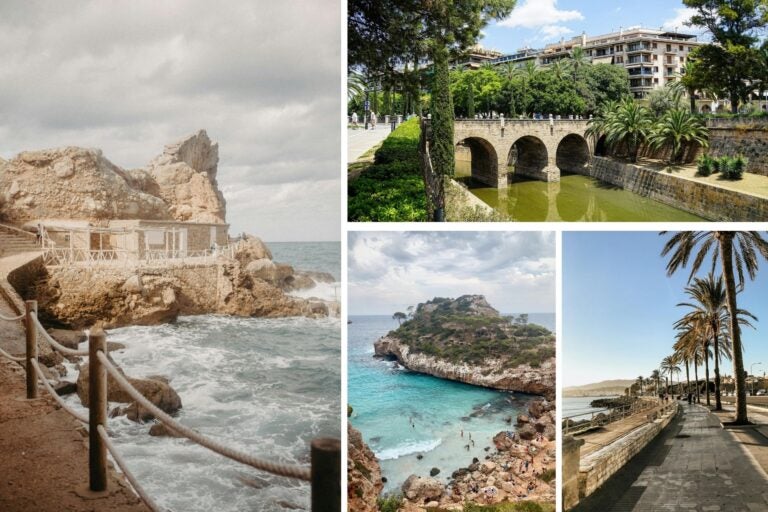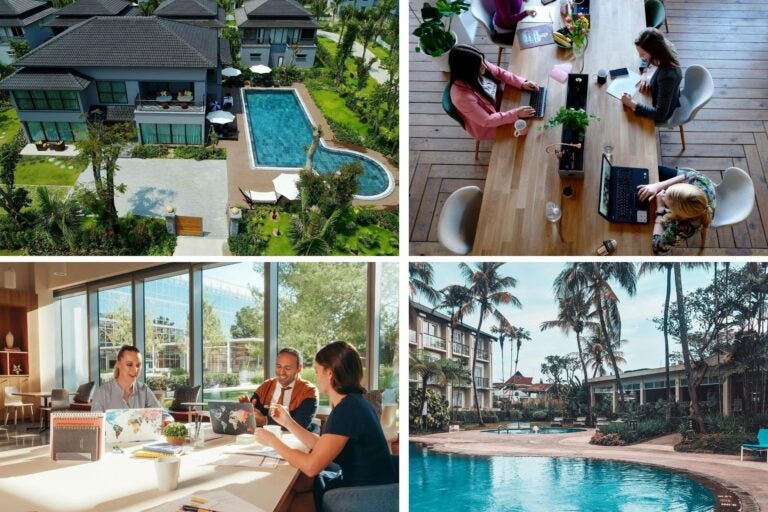Live in Majorca: Learn advantages, disadvantages & costs
Live in Majorca and experience the beauty of island life, with top services and a welcoming vibe for foreigners.
Ever thought about moving to a Spanish island for a while? Choosing to live in Majorca could be a fantastic option. It is the largest of the Balearic Islands and a favorite destination for people from all over the world, including digital nomads, retirees, families and students. Majorca offers so much more than just sun and beaches. According to Mercer’s quality of life ranking, Palma de Mallorca is among the Spanish cities with the best balance between work and personal life.
In this article, we’ll take a closer look at what life is like on the island, covering key aspects such as the education system, access to healthcare, safety, and the local economy. We’ll also go over the main pros and cons of living in Majorca and explore whether it is a good destination for remote work. Join us on this journey through Majorca!
Quality of life in Majorca
If you’re thinking about living in Majorca, you should know that the island offers a high quality of life, with excellent public services, modern infrastructure, and advanced digital technology.
What really makes life in Majorca even more appealing is its Mediterranean climate, with mild temperatures all year round. That is one of the main reasons why people from northern Europe are drawn here, whether to spend a few months, buy a holiday home, study, work remotely or settle down for retirement. In the next section, we will explore the services available on the island and how newcomers can make the most of them.
Learn about Majorca’s education system
Education on the island follows the Spanish national system which, according to the OECD’s PISA report, achieves average standards similar to those in countries like France and Italy. If you are a student considering living in Majorca to pursue a university program, you will find a wide choice of public, semi-private and private institutions. The island is also a popular destination for studying English at international schools. Here are some of the most notable institutions:
- University of the Balearic Islands (UIB): It is the only public university on the island and is well known for its research in renewable energy. According to the 2024 CYD ranking, it ranks among the top ten universities in Spain for employability in the tourism sector.
- ESERP Business School: Offering programs in Spanish and English in marketing, communications, finance, and human resources, with a hands-on approach that involves working directly with companies.
- Baleares Business School: A private school focused on business and leadership studies for professionals.
If you want to study on the island as an international student, you can apply for one of the scholarships offered by the Spanish government, such as the Erasmus+ program or MEC grants. If you are not from the European Union or the European Economic Area, you will need to apply for a student visa at the Spanish embassy in your country to be able to live in Majorca while studying.
Majorca, a safe place to live
Living in Majorca comes with a high level of safety. According to data from the Spanish Ministry of the Interior, the island is one of the safest regions in Spain, with a lower crime rate than many other Spanish and European cities. Most incidents are minor, such as petty theft, particularly in popular tourist areas like Magaluf, S’Arenal, or Pere Garau. Curious to find out which areas on the island are the most peaceful to live in?
- Calvià: It is an upscale municipality, with residential areas such as Santa Ponça, Costa d’en Blanes, and Bendinat. Many foreign families and retirees choose to live there.
- Sóller and Port de Sóller: A mountainous and coastal area with a peaceful atmosphere and local residents.
- Pollensa and Puerto Pollensa: North of the island and surrounded by nature, where many foreign citizens, British and German, live.
- Alaró and Santa María del Camí: If you enjoy a rural setting, the inland villages with low population density offer a particularly peaceful place to live in Majorca.

What is healthcare like in Majorca?
Like the rest of Spain, Majorca has a public healthcare system that is universal and accessible to foreigners, whether they are legal residents or temporary visitors. According to the Global Health Index, Spain ranks among the countries with the best access to and quality of healthcare in the world, and the Balearic Islands maintain the same high standard. Some of the best hospitals on the island include:
- Son Espases University Hospital (Palma): A leading public hospital in the Balearic Islands, located on the outskirts of the city. It is well connected by public transport and offers services in English and German.
- Rotger Clinic: Located in the city center and part of the Quironsalud group, it is one of the most prestigious private clinics on the island, featuring state-of-the-art facilities.
- Juaneda Miramar Hospital: A private hospital offering medical care in more than 10 languages, specializing in health tourism.
If you are a foreigner, there are some formalities to take care of before you can use public or private healthcare on the island, which vary depending on your nationality. Here is what you need to know to get started:
- EU/EEA citizens: Apply for the European Health Insurance Card (EHIC) through your country’s health authority. This will allow you to access public healthcare just like any local resident.
- Non-EU foreigners: If your home country is outside the EU, you will need to take out private health insurance in addition to your student, remote work, or employment visa.
- Foreigners who pay contributions: If you work legally on the island for a local company, you can apply for an Individual Health Card (TSI) at a health center, which gives you access to public healthcare.
- Foreigners who do not pay contributions: If you are legally living in Majorca but are not working or contributing to the Spanish social security system, you can join the healthcare system through a special agreement. The monthly fee is $70 for people under 65 and $175 for those over 65.
Economy and labor market
Living in Majorca can be pricey. The island is roughly 15% more expensive than Spanish cities like Valencia or Seville, but it is still cheaper than major European cities like Paris or London, according to Numbeo. You can cut down on housing and daily expenses by choosing inland towns such as Inca or Manacor instead of the tourist hotspots, where prices can climb quickly.
The island’s economy is largely driven by tourism and hospitality, with an average monthly salary of around $1,500, slightly below the national average. If you are planning to come to the island to find local work, you will likely find opportunities in:
- Summer season: Waiter, cook, tour guide, water sports instructor, shop assistant, room service waiter, or receptionist.
- Year-round jobs: Language teacher, programmer, nurse, physical therapist, or doctor.
If you are from outside the EU, you will need a work visa to take up paid employment on the island. Alternatively, you could work remotely as a digital nomad or entrepreneur, earning income from clients abroad under Spain’s digital nomad visa.

Connect to the internet in Majorca
One of the perks of living in Majorca is its modern telecommunications network, which is especially valuable if you work remotely. High-speed fiber optic internet even reaches some rural areas, thanks to digitalization programs supported by the Balearic government.
The main providers on the island are Movistar, Vodafone, Orange, and Digi, offering average internet speeds between 200 and 600 Mbps. When it comes to online shopping, Majorca has access to services like Amazon, Shein, Glovo, Just Eat, and online supermarkets such as Ulabox and Caprabo a Casa.
If you are a digital nomad and need a fast, reliable internet connection, Holafly offers monthly plans with unlimited data, stable 5G coverage across the island, and the option to connect two devices at once, all for $64.90 per month.
Important: If you are a frequent traveler and want to stay connected without worrying about expensive roaming or looking for a new SIM at every destination, Holafly’s subscription plans are for you. With a single eSIM, enjoy internet in more than 170 countries for a fixed price and no surprises on your bill. Travel without limits and connect easily and securely! 🚀🌍

What are the advantages of living in Majorca?
Beyond the services available to residents in Majorca and the support offered by the Balearic government for international visitors, there are many other advantages tied to the island itself and its way of life. The benefits of spending time here are almost endless, but here is a list of some of the most notable ones:
- Mediterranean climate: You can look forward to more than 300 days of sunshine a year, with mild winters and warm summers. That means you can enjoy outdoor activities year-round, as well as water sports like surfing, diving, and windsurfing.
- Natural environment: You have both the sea and the mountains right on your doorstep, from the UNESCO-listed Serra de Tramuntana to the island’s famous white-sand beaches such as Es Trenc, Playa de Muro, and Cala Agulla.
- Good conditions for remote working: Majorca has a wide range of coworking spaces with high-speed wifi, offering modern facilities ideal for working remotely.
- Local cuisine: Mediterranean cuisine, local wines, and organic markets make it easy to enjoy a healthy diet every day, with traditional dishes such as lamb stew, arroz sucio, pa amb oli, and the island’s vegetable soups.
- Easy mobility on the island: Distances on the island are short, so you can often walk to the beach in just a few minutes, and getting around Majorca is easy thanks to its well-connected road network and public transport.

Disadvantages of living in Majorca as a foreigner
While all these advantages may make the idea of moving to the island very tempting, it is also important to consider the less positive sides of living in Majorca. Most of these are related to the cost of living, housing, and employment. Here are the main drawbacks you should keep in mind:
- High cost of living: In tourist-heavy areas like Palma, Sóller, or Andratx, rental prices, restaurants, services, and entertainment tend to be very high. If you want to find a more affordable place to live, you’ll need to look inland.
- Unaffordable housing: There is a significant shortage of long-term rentals on the island, as short-term tourist rentals dominate the market, often requiring several months’ deposit, references, and proof of financial stability.
- Seasonal employment: Most job opportunities on the island are seasonal, running from April to October and primarily focused on tourism. If you are looking for permanent employment, this can make your search more challenging.
- Mass tourism: During the peak summer months, the island is crowded with tourists from all over the world, especially in coastal areas, which leads to more noise, traffic, and crowded beaches.
- Island isolation: Although Majorca has an airport, living on an island can sometimes feel a bit isolating. If you need to travel quickly to the mainland or to other European cities, your only options are by plane or ferry.
Frequently asked questions about living in Majorca
You can get around Majorca easily using public transport, cycling, or walking. But to fully explore the island, from hidden beaches to charming inland villages, having a car is really necessary.
In tourist areas, many people speak English. However, in rural parts of the island, most locals speak only Spanish or Catalan, so having some knowledge of Spanish will help you integrate more easily.
Absolutely, education for children in Majorca is high-quality, with options for bilingual schools. On top of that, there are many family-friendly residential areas, offering a safe environment and easy access to nature.
Majorca hosts many music festivals, such as the Mallorca Live Festival, as well as traditional celebrations like Sant Antoni and the Fiestas de la Beata. You can also enjoy films at the cinema, theater performances, and visits to local markets. The pleasant weather makes it easy to spend time outdoors and socialize with locals.
Foreigners tend to favor Palma, particularly the old town, Santa Catalina, and El Terreno, for their vibrant city life and amenities. Quieter areas like Sóller, Deià, and Valldemossa appeal to those who prefer a more natural setting, while inland towns such as Inca and Binissalem offer a calm, local atmosphere.





 Language
Language 


















 No results found
No results found


